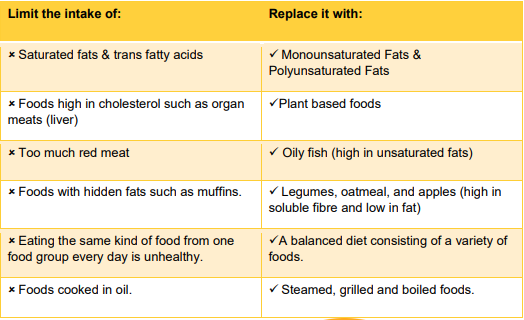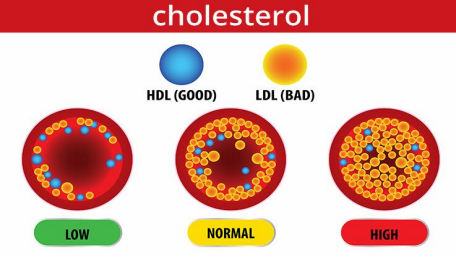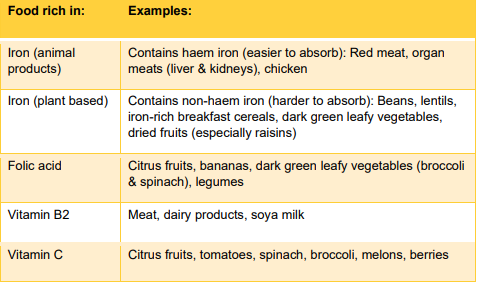Consumer Studies - Nutritional and Food Related health conditions
1/24
There's no tags or description
Looks like no tags are added yet.
Name | Mastery | Learn | Test | Matching | Spaced | Call with Kai |
|---|
No analytics yet
Send a link to your students to track their progress
25 Terms
Why is a healthy lifestyle and balanced diet important?
For effective functioning, to keep people healthy, disease prevention, management of health conditions.
When will blood glucose level rise rapidly?
When high GI foods are ingested
What helps to absorb the excess glucose?
Insulin
What are the causes of high blood glucose levels (hyperglycaemia)?
Eating foods with a high sugar content
Lack of exercise
High and prolonged levels of stress
How can you prevent and manage hyperglycaemia?
Avoid consuming too much high GI-foods
Regular physical exercise
Consume more low GI-foods
What are some high GI-foods?
White bread
Cake
Energy drinks
Watermelon
What is coronary heart disease?
When the coronary arteries become damaged
What are the causes of coronary heart disease?
Smoking
High cholesterol
Inactive lifestyle
Obesity
Hereditary
Diet rich in saturated fats
How to prevent coronary heart disease?
Maintain a healthy lifestyle through dietary changes
Medication or surgery
What are the dietary changes that can prevent coronary heart disease?

What is high blood cholesterol?
When the fatty plaque builds up on the inner walls of arteries
Why is good blood flow important?
Can prevent: strokes, heart attacks and gangrene (death of body tissues due to lack of blood flow)
What is cholesterol?
A soft, white, waxy substance produced in the liver and transported to all body cells.
What are the two types of cholesterol?
HDL
High density lipoprotein: good cholesterol that transports excess cholesterol to the liver
LDL
Low density lipoprotein: bad cholesterol that builds up and hardens in the arteries (arteriosclerosis)

What are the causes of high LDL and low HDL cholesterol levels?
Genetic
Excess cholesterol cannot be excreted
How can you regulate high LDL and low HDL levels?
Dietary and lifestyle changes
Balanced diet
Limit the intake of saturated fats → replace with unsaturated fats
Avoid trans fatty acids/deep fried foods
Limit salt and sugar intake
Limit alcohol intake
Exercise regularly
Medication if LDL levels remain high
What is high blood pressure (hypertension)?
When the pressure of the blood against the walls of the arteries is too high.
What are the possible causes of high blood pressure (hypertension)?
High salt intake
High alcohol intake
Imbalance of hormone levels
Thyroid and kidney problems
Genetic factors
Smoking
High stress levels
What are some lifestyle changes that can be made to prevent or manage hypertension?
Manage stress
Limit coffee and tea intake
Limit alcohol intake
Exercise more often
Don’t smoke
Eat more whole grain products
Eat low-fat products
What is anaemia?
When there are not enough red blood cells in the blood due to a deficiency of iron, haemoglobin, vitamin B12 and folic acid
What is haemoglobin?
Iron-containing protein that transports oxygen from the lungs to the rest of the body → allowing CO2 to be exhaled
What are the symptoms of anemia?
Fatigue
Weakness
Short breath
Dizziness
Headaches
Pallor
Poor appetite
How to prevent or manage anemia?
Use supplements
Undergo medical procedures
Make dietary adjustments
What are the causes of anemia?
Blood loss
Surgery, a stomach ulcer, medication, heavy menstruation, bleeding in the digestive tract
Lack of red blood cell production
Poor diet, poor iron absorption due to diarrhoea/medication, common during pregnancies
How to prevent or manage anaemia?
Make dietary adjustments
Monitor babies with a low birth weight
Iron and folic deficiencies should be investigated during pregnancy
